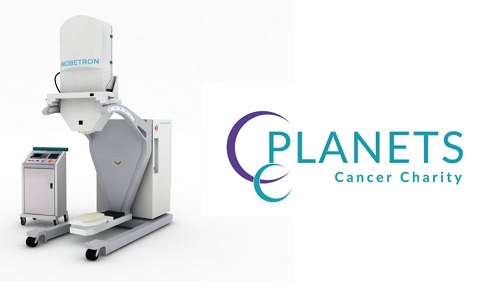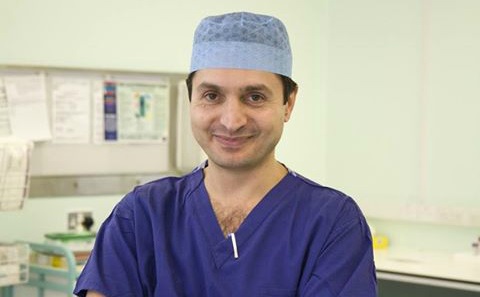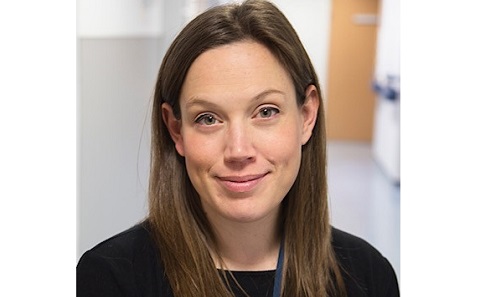Cancer patients to be offered a pioneering radiotherapy technique in a new clinical trial

Cancer patients in the south are being offered a pioneering radiotherapy technique as part of a new clinical trial.
Intraoperative electron beam radiotherapy (IOERT) is delivered directly to the cancer site during surgery to try and ensure no cancer cells are left behind.
People undergoing surgery at University Hospital Southampton (UHS) for rectal cancer that has spread into the pelvis will be invited to join the ELECTRA trial, which aims to see whether this precision radiotherapy can improve surgical outcomes.
The trial is being run by the Cancer Research UK Southampton Clinical Trials Unit at the University of Southampton and is led by Alex Mirnezami, Professor of surgical oncology and consultant colorectal surgeon at UHS.

“Advanced and recurrent Rectal cancers in the pelvis can be very difficult to treat,” says Professor Mirnezami. “Standard treatment involves chemotherapy and radiotherapy, followed by an operation to remove the cancer. But if the cancer cells are at the edge of the removed tissue, there is a high chance of leaving cancer cells behind which can regrow into a new tumour and cause the patient to relapse.”
Intraoperative electron beam radiotherapy (IOERT)
Radiotherapy is a common cancer treatment, given to around half of all patients, where a high energy electron beam is used to destroy cancer cells in an affected area of the body.
By giving an extremely precise, targeted dose of radiotherapy directly to the cancer site during surgery, intraoperative electron beam radiotherapy (IOERT) aims to destroy any remaining cells and reduce the chance of the cancer returning, as well as reducing damage to healthy surrounding tissue.
Daniel Griffiths, Trial Manager for the ELECTRA trial at Southampton Clinical Trials Unit, said: “While IOERT is already used for some surgeries in Southampton, it is not currently provided by the NHS. During this trial, we will gather evidence as to how effective the procedure is at removing all cancer cells, and whether it should be routinely provided for people undergoing surgery for this cancer type.”
University Hospital Southampton (UHS) currently has the only IOERT machine in the UK, funded by the Havant-based PLANETS cancer charity which is supporting the new trial.
Layla Stephen, CEO of PLANETS, said: "We are extremely proud to have funded the UK’s first mobile electron beam radiotherapy machine - Mobetron - since 2016. It is a ground-breaking treatment, and our teams have seen some really positive initial results in a range of different cancers.
“However, it is very expensive at a cost of over 800k for the machine itself and ongoing costs, all of which are currently met by our charity. More evidence is needed through clinical trials before it will be considered for NHS funding and become a standard part of treatment for patients who may benefit from it. Therefore, securing the ELECTRA trial is a significant development that could help provide that evidence for this patient group and that is very exciting.”

Georgie Parsons, 37, was treated with IOERT in 2019 during surgery for a reoccurrence of bowel cancer.
“I felt very special and lucky to have the opportunity to receive IOERT,” says Georgie. “The cancer was growing in a tricky place and was difficult to treat it where it was. Therefore, the principles of providing radiotherapy directly to the cancer during surgery made sense.”
Following surgery, Georgie completed a course of chemotherapy and is now coming up to 3 years post-surgery with no active cancer. Georgie was previously a research nurse herself, and now works for the National Institute of Health and Care Research (NIHR).
“I was, and still am, incredibly grateful to Professor Mirnezami, the whole team in Southampton, and PLANETS for the care that I received. I wanted to do something to say thank you and to help others who maybe in a similar situation in the future. Being a patient representative for the trial was one way I could do that.”
“I am proud to be part of research that may help cancer patients and that may help fund the machines’ use in the NHS. I hope the trial provides the experts with more information about IOERT and leads to more developments in this field of cancer treatment.”
The ELECTRA trial aims to determine the acceptability and feasibility of recruiting, randomising and delivering IOERT in a randomised controlled trial (RCT) with the hope it will lead to a future late phase trial. The trial is funded by IntraOp who make the IOERT machine. It is endorsed by Cancer Research UK with support from the PLANETS charity.
Notes for editors
The ELECTRA trial - A double-blinded feasibility study of intraoperative electron beam radiotherapy in patients with locally advanced or locally recurrent rectal cancer. ELECTRA aims to determine acceptability and feasibility of recruiting, randomising and delivering IOERT in a randomised controlled trial (RCT) setting as preparatory work for a future late phase RCT. For more information, visit the ELECTRA trial web page.
Southampton Clinical Trials Unit (SCTU) is a Cancer Research UK funded CTU with expertise in the design, conduct and analysis of interventional, multi-centre clinical trials. The CTU is based within the University of Southampton with offices at the University Hospital Southampton NHS Foundation Trust Southampton General Hospital site. For more information, visit the SCTU website.
University Hospital Southampton NHS Foundation Trust (UHS) is one of the largest acute teaching trusts in England with a turnover of more than £1 billion in 2020/21. UHS provides hospital services for 1.9 million people living in southern Hampshire and specialist services – including neurosciences, respiratory medicine, cancer, cardiovascular, obstetrics and specialist children’s services – to more than 3.7 million people in central southern England and the Channel Islands. UHS is consistently one of the UK's highest recruiting trusts of patients to clinical trials and in the top ten nationally for research study volume as ranked by the NIHR Clinical Research Network. In partnership with the University of Southampton, UHS has £27 million of NIHR infrastructure dedicated to bringing the latest treatments to patients. Visit the UHSFT website.
PLANETS is a cancer charity which helps patients with pancreatic, liver, abdominal (colorectal) and neuroendocrine cancer by funding patient support groups, innovative treatments and research.
- Since 2011 PLANETS has raised more than £1.3 million, including key achievements such as:
- Establishing a network of patient support groups across the Wessex region
- Funding the introduction of intra operative radiotherapy (IORT) with the UK’s first mobile electron beam radiotherapy machine which is able to deliver radiotherapy to advanced cancers during surgery
- Funding a full-time pancreatic and neuroendocrine tumour researcher to work with the clinician scientists in Southampton’s world leading cancer immunology research department.
- The charity is primarily dedicated to serving the needs of a regional population which cover four million people living across Hampshire, Wiltshire, Dorset, the Isle of Wight, the Channel Islands and West Sussex, but is increasingly involved in national and international research and clinical innovation.
- In total PLANETS needs to raise another £1 million over the next five years to achieve goals including a total of another £100,000 over the next 12 months to fund IORT and another £250,000 to fund it through to the end of its working life (2030). Meanwhile, its ongoing commitment to patient support requires £50,000 over the next five years and a treatment option for advanced cancers, known as intra-abdominal heated chemotherapy treatment, has been funded by the charity but requires an additional £50,000 for ongoing costs in hospital. Visit the PLANETS website.